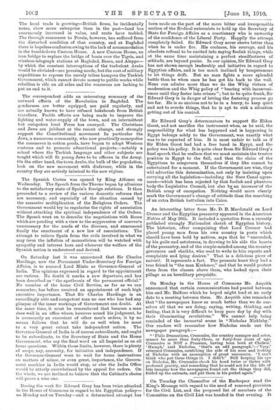On Saturday last it was announced that Sir Charles Hardinge,
now the Permanent Under-Secretary for Foreign Affairs, is to succeed Lord Minto as Governor-General of India. The opinions expressed in regard to the appointment are various. No doubt it marks a new departure, and has been described as " the apotheosis of the permanent official." No member of the home Civil Service, as far as we can remember, has before received an appointment of such high executive importance. That Sir Charles Hardinge is an exceedingly able and competent man no one who has had any glimpse of the inner workings of Government can doubt. At the same time, it must be remembered that because a man does well in an office where, however sound his judgment, he is necessarily an executant of other men's orders, it by no means follows that he will do as well when he must to a very great extent take independent action. The Governor-General of India is of course subordinate, and ought to be subordinate, to 'the Secretary of State and the Home Government, who say the final word on all Imperial as on all home questions. Within these limits, however, there is plenty of scope, nay, necessity, for initiative and independence. If the Governor-General were to wait for home instructions on matters of minor, or even great, importance, the Govern- ment machine in India would stop, or else the India Office would be utterly overwhelmed by the appeal for orders. On the whole, we are inclined to believe that the Cabinet's choice will prove a wise one.










































 Previous page
Previous page